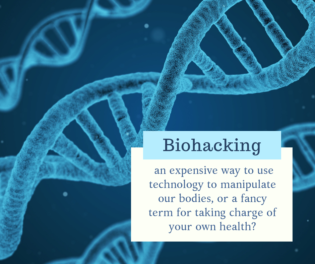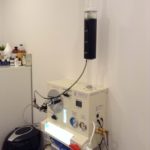
Learn to “BioHack” Your Way to Better Health
If you follow health-related news or listen to health podcasts, or are familiar at all with Dave Asprey and his Bulletproof brand, you’ve probably come across the term “biohacking” recently. The word itself might sound intimidating to the average person, but the concepts behind biohacking are actually quite simple: The goal is to “hack” your body’s natural processes to improve your physical, emotional, and cellular health.
Taken to extremes, biohacking’s “citizen science” approach can lead to unsupervised experiments outside of conventional research facilities. Extreme biohackers pursue activities such as trying to alter their DNA or implanting cybernetic devices into their own bodies., which is not necessarily a safe or recommended approach!
Fortunately, you don’t have to track every nanosecond of your day or spend a small fortune to benefit from biohacking best practices – biohacking your health can be as easy as applying the latest scientific discoveries to your own life and adjusting as you go; that’s always a good approach to our well-being.
One of the central tenets of biohacking is that the things you put into your body (what you eat, the air you breathe, the sounds you are exposed to) shape your body’s output (your energy, productivity and moods). Your mitochondria are at the heart of this process. Mitochondria are the “batteries” that give energy to every cell in your body, and are most highly concentrated in your brain, eyes, heart and ovaries (for us women). These tiny powerhouses are easily influenced by their environment – in other words, they are impacted by everything your body is exposed to. When you improve their environment, you can improve the energy produced by mitochondria. The results? Far-reaching improvements on your overall health and energy levels.
What does this process look like in everyday life? Well, because we’re all different, what works for one person might not work for someone else. As you make changes to your lifestyle, you should carefully monitor your progress as you go. Biohackers draw on the data they create to come up with solutions that make them feel their best. They avoid “one size fits all” formulas.
That means paying close attention to how you feel, but the results are definitely worth it. By improving cellular function, biohacking your basic daily activities can have noticeable benefits. And it can be fun! After all, who doesn’t want to use science to feel better every day? Check out some easy ways to biohack your own health. The results might surprise you!
Monitor your diet. Adjusting your nutritional intake is an easy way to start biohacking. It’s a simple concept: any change to your diet that results in noticeable improvements in how you feel is a biohack.
In general, focus on the fact that what you eat influences your gut bacteria and, in turn, every aspect of your health. By choosing natural, high-fiber foods, you can reduce inflammation. Too much inflammation affects mitochondria, leading to mitochondrial dysfunction, which can impact your entire body.
In general, biohackers focus on the nutritional quality of foods, not the calorie count. Many biohackers follow a gluten-free diet with plenty of healthy fats. Some have good results with intermittent fasting. But ultimately, the key is to pay attention to how your diet makes you feel and make adjustments based on that.
Focus on natural products. Even if we’re careful about what we eat, our bodies are still exposed to harmful elements as we go through the day. The water we drink, the substances we clean with and the beauty and grooming products we use can all hold harmful toxins. These toxins impact our cellular health in ways we may not even realize. Consciously seeking out natural beauty products and non-toxic cleaning solutions can help you assess the impact of toxic ingredients on your body. If you’re not sure what ingredients to avoid, take a look at the website for the Environmental Working Group (ewg.org); they’re the ones that issue the ‘dirty dozen/clean fifteen’ list annually, so you know they’ve got your back.
Improve your sleep. By adjusting our night routines, we can improve the quality of our sleep. Biohackers look beyond the standard advice on improving sleep to carefully consider what we surround ourselves with at bedtime. For example, you may have great results by reducing the amount of blue light you’re exposed to at night. Blue light comes from electronic devices. What can be a helpful practice is staying off your devices for 3 hours before bed or switching your devices to “night mode.” Reducing the temperature in your room and minimizing exposure to electromagnetic fields can also lead to world-class sleep. If you must keep your phone in your bedroom, turn it onto airplane mode at night.
Keep in mind that our mitochondria want to sleep when it’s dark and awaken when it’s light. Make it easier for them by creating a sleep environment that’s as dark as possible. If needed, invest in some blackout curtains or a sleep mask. You can also create a sleep-friendly internal environment by avoiding caffeine at least eight hours before you go to sleep.
Adapt to stress. Some biohackers use complex biofeedback systems to monitor the effect of stress on their bodies, but controlling stress can be as simple as paying attention to your breathing. (One biohack technique is “block breathing,” which means exhaling while counting to five, then repeating the count on the inhale. Do this several times and note how you feel after.) Classic stress reduction techniques such as yoga, meditation, and “forest bathing” (walking in the wilderness) can all contribute to lower stress levels.
It may seem like a bit of a paradox, but some biohackers recommend high-intensity interval training (HIIT) for improving a body’s ability to handle stress. That’s because HIIT emphasizes taxing a body to its maximum capacity, then allowing it to recover. As a result, we teach our bodies to be more resilient. Talk to a healthcare provider if you haven’t tried HIIT training before.
Hormones control it all. The hormonal balance in your system plays a huge role in pretty much everything. Having a balanced hormonal state is key to maintaining not just good health, but this balance also allows for all of the above-mentioned tips to actually work for you. When our hormones are out of alignment, it affects so many of our daily activities. Trying to even get through the day can be a challenge, let alone trying to take your health to another level.
As you can see, biohacking doesn’t have to be complicated. Ultimately, you’re the best scientist when it comes to your own well-being. Why not make a few simple changes to your lifestyle to see how you feel?
If you’d like to look deeper into your current status of health, find out if your hormones are causing issues in your body or learn how you can take your health to the next level, come into the clinic and let’s talk. I’m very fortunate in that our team are experts in looking at the individual as a whole and creating a unique plan to get your body functioning its best.
Sources:
https://www.ncbi.nlm.nih.gov/pubmed/22496061
http://www.jbc.org/content/280/22/21061.full
https://www.sciencedaily.com/releases/2017/03/170307155214.htm
https://www.theguardian.com/science/2015/nov/18/biohackers-strange-world-diy-biology







